analysis East Asia
Fall of the 'Fujian clique' - what China's military shake-up signals for Xi's grip on the armed forces
A purge of generals and a loyalist’s promotion highlight President Xi Jinping’s tightening grip on the military while hinting at a growing trust deficit within its top ranks, say analysts.
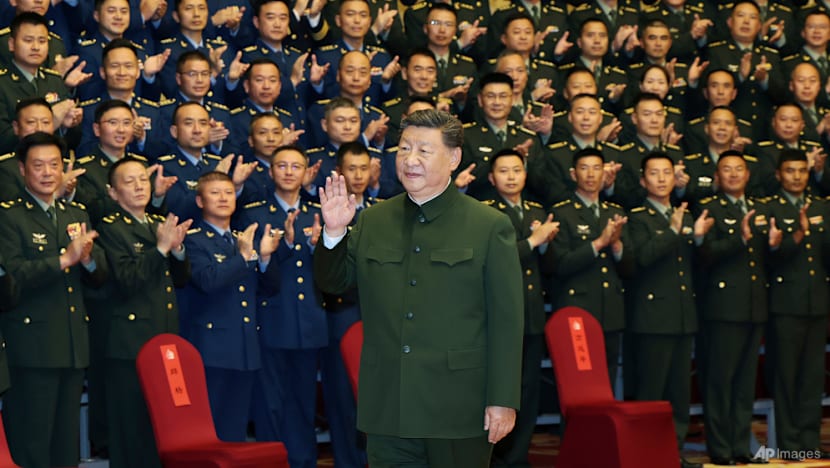

This audio is generated by an AI tool.
BEIJING: Purges and a promotion - China’s shake-up of its military top brass at a key Communist Party gathering underscores President Xi Jinping’s drive to reinforce loyalty and control over the armed forces as the country marches towards a series of political milestones, say analysts.
The expulsion of senior generals and the elevation of long-time graft-buster Zhang Shengmin to vice chair of the Central Military Commission (CMC) are targeted moves to steady confidence in a military unsettled by corruption probes, they note.
The shake-up also effectively marks the squeezing out of the so-called Fujian clique - a network of senior commanders who once dominated the Eastern Theater Command, the unit responsible for operations around Taiwan.
Xi is familiar with many of these figures, having spent more than a decade rising through the political ranks in Fujian before moving on to other provinces and later national leadership.
Analysts say their removal not only signals Xi’s tightening grip over the strategically crucial command but also underscores his willingness to dismantle even factions once seen as loyal to him.
While analysts expect the Chinese supremo’s sweeping corruption crackdown to continue and possibly intensify following the reshuffle, they do not believe it will undermine the armed forces’ operational performance or modernisation goals.
TRUST AS A COMMODITY
The personnel changes were confirmed on Thursday (Oct 23) in a communique issued after the close of the fourth plenum, a four-day gathering of the Central Committee that also endorsed the country’s next five-year development blueprint.
The Central Committee sits below the Politburo and its apex standing committee, comprising about 200 full and 170 alternate members drawn from the party elite.
"The plenary session decided to endorse Zhang Shengmin as vice chairman of the Central Military Commission," the communique tersely stated.
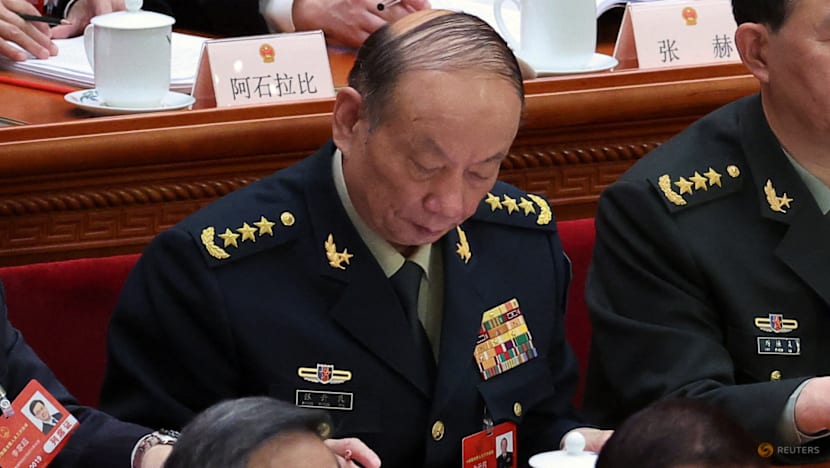
Zhang Shengmin, 67, is a veteran political officer who has been secretary of the CMC’s Discipline Inspection Commission since 2017, serving as a key enforcer of Xi’s sweeping military clean-up.
He succeeds He Weidong, the former vice chair who, along with ex-CMC Political Work Department chief Miao Hua, was expelled from both the military and the party.
He Weidong was a Politburo member, and his expulsion reduces the 24-member body to 23 active members.
Also among the fallen top brass were He Hongjun, Wang Xiubin, Lin Xiangyang, Qin Shutong, Yuan Huazhi and Wang Chunning. Together, they represented the uppermost echelon of China’s armed forces, spanning the People’s Liberation Army’s (PLA) Eastern Theater Command, Rocket Force and People’s Armed Police.
No new members were added to the CMC, leaving it at its downsized four-member line-up under Xi’s chairmanship. The body, which initially comprised seven members, was left shorthanded after the earlier ouster of ex-defence minister Li Shangfu in 2023, followed most recently by the removals of He Weidong and Miao.
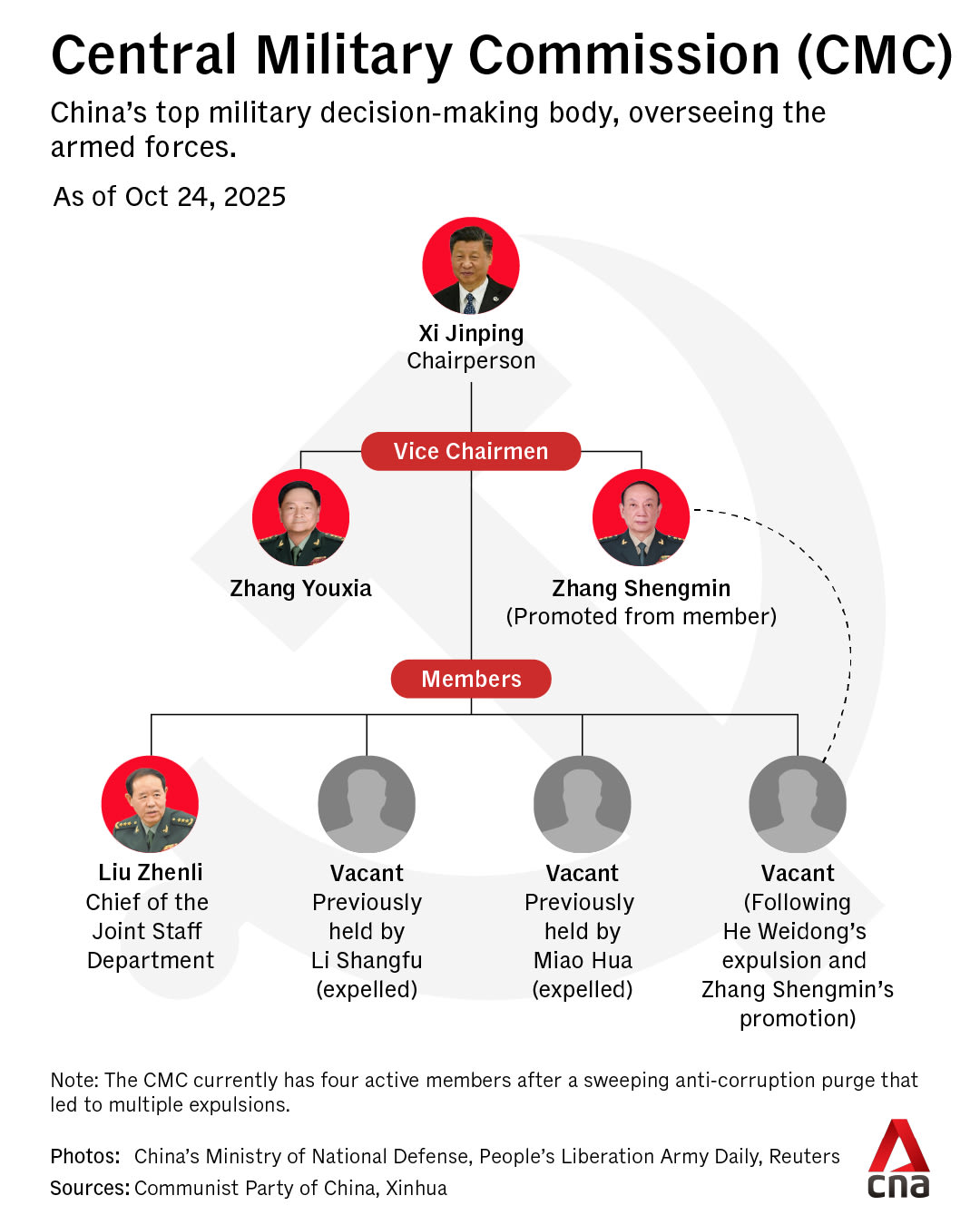
Analysts said the shrinking circle at the top of China’s military and the absence of new appointments to the CMC suggest a deeper issue of trust within Xi’s inner ranks.
“Xi’s circle (of trust) is getting smaller and smaller … instead of filling up the vacancies in the CMC, he promoted someone who is already on (it),” said Yang Zi, a research fellow at the S Rajaratnam School of International Studies (RSIS) in Singapore.
“This shows that he does not have a good alternative person that he could put in place,” he told CNA.
Yang further suggested that Xi’s civilian background has limited his ability to cultivate trusted military allies.
“Xi did not spend most of his career in the military - only about two to three years when he was quite young - so he never came from a real military background or had a solid faction within the PLA. With a smaller circle, it’s easier for him to exercise power,” he said.
Against this backdrop, Zhang Shengmin’s track record as the Chinese supremo’s long-time anti-graft enforcer built up “rapport” between the two men and made him a natural fit for promotion, Yang said.
Lim Tai Wei, an East Asian affairs observer and professor at Soka University, said Zhang Shengmin’s appointment also signifies the “desire for experience and a long-serving record with integrity”.
“(Xi) wants only loyalists, even if it means at the expense of removing his own initial picks,” he told CNA.
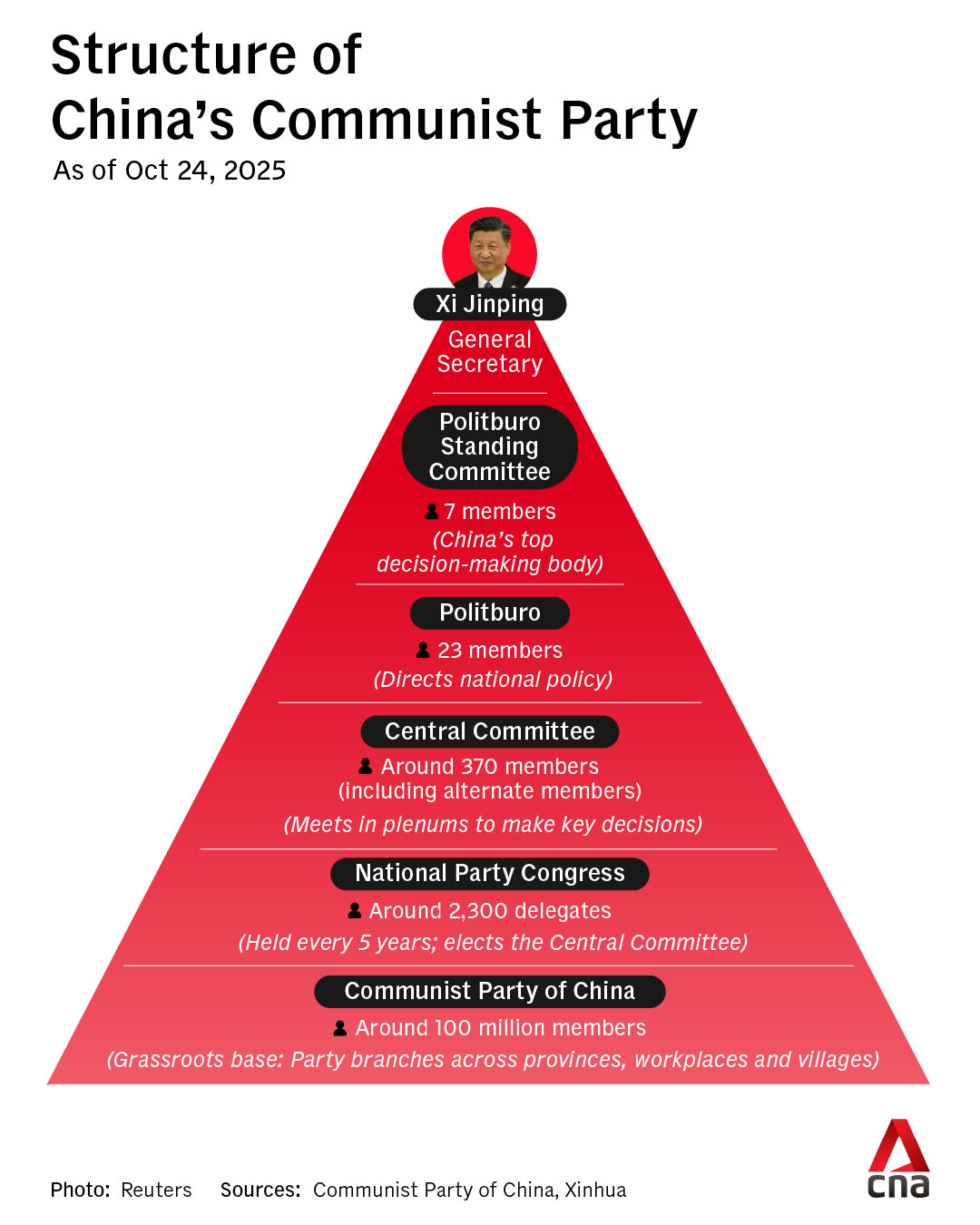
THE FUJIAN CONNECTION
Analysts highlighted that the generals’ downfall effectively marks the dismantling of the so-called Fujian clique, a faction within the PLA that was once seen as the power base anchoring Xi’s rise through the military.
Its members - including He Weidong, Miao and Lin Xiangyang - all hailed from Fujian province facing the Taiwan Strait and had served in the 31st Group Army, a former elite unit of the Nanjing Military Region responsible for Taiwan operations.
China views Taiwan as its territory and has stepped up military and economic pressure in recent years.
Xi, who worked in Fujian province from 1985 to 2002, later promoted many of these officers as he consolidated his authority over the PLA after becoming Chinese supremo in 2012.
Miao was appointed head of the CMC Political Work Department in 2017, while 2022 saw He Weidong promoted to CMC vice chair and Lin Xiangyang named commander of the Eastern Theater Command.
However, the latest purge has resulted in the expulsion of all three men from the party and the stripping of their military ranks.
Analysts said their downfall underscores how Xi’s anti-corruption campaign has swept through even those once viewed as his most trusted lieutenants, adding that the group’s collapse may also reflect shifting power dynamics within the military’s inner circle.
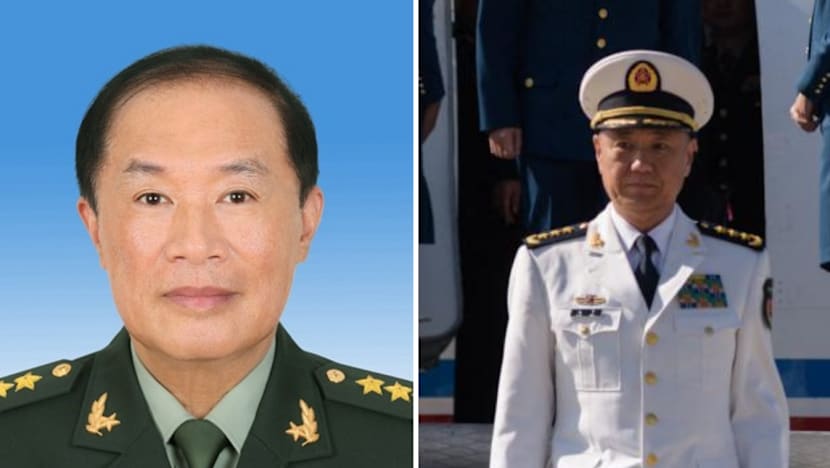
According to Lim from Soka University, talk circulating in Beijing suggests that competition between the Fujian clique and other factions may have played a role in their purge, even as he cautioned that China’s “opaque” political system makes them nearly impossible to verify.
Lim added that international observers have speculated on whether the ongoing military reshuffle could influence Beijing’s Taiwan strategy, given that the Fujian-linked commanders once oversaw operations across the strait.
“One school of thought, particularly from the West, says this will probably delay any plans regarding cross-strait contingencies or other configurations,” he said.
“But again, this is all speculation and conjecture.”
CONSOLIDATING AUTHORITY, MAINTAINING STABILITY
The reshuffle concurrently signals a consolidation of power under Xi, who heads the party, the state and the military, analysts said.
Lin Ying-yu, an associate professor at the Graduate Institute of International Affairs and Strategic Studies at Tamkang University in Taiwan, believes the decision to leave vacancies on the CMC unfilled appears deliberate.
“Xi is centralising power and deliberately keeping the structure tight,” he told CNA.
Aside from Xi and Zhang Shengmin, the other two sitting members of the CMC are Zhang Youxia and Liu Zhenli.
Zhang Youxia, 74, is the senior vice chair of the CMC and one of Xi’s longest-serving allies in the armed forces. A career army officer and war veteran, he oversees military operations, training and weapons procurement within the PLA. His ties with Xi run deep, with their fathers being revolutionary comrades.
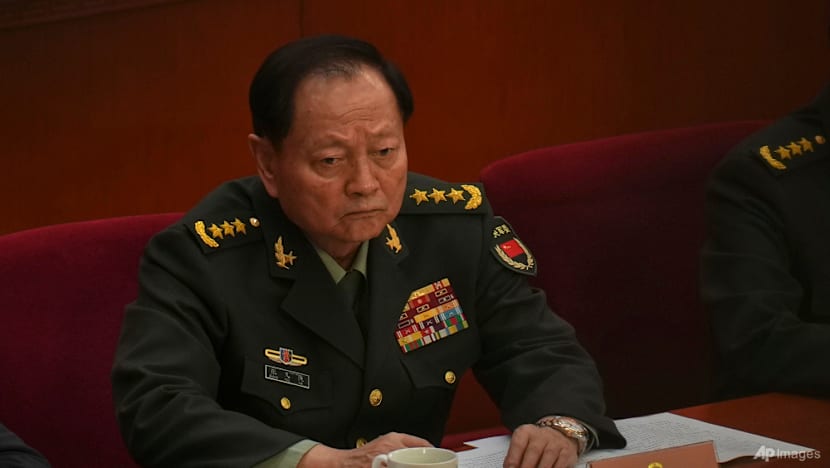
Meanwhile, Liu is the CMC’s Joint Staff Department chief, responsible for overseeing the PLA’s joint operations, training and combat readiness.
Neil Thomas, a fellow on Chinese politics at the Asia Society Policy Institute’s Center for China Analysis, expects Xi to hold off on appointing new members to the CMC until the 21st Party Congress in 2027, when a broader round of leadership changes is expected.
“He’ll probably wait until then to vet new CMC members,” Thomas said, describing it as a “smart move” given their “recent form”.
Tamkang University’s Lin Ying-yu noted that the real test lies ahead, when the next round of promotions - including but not limited to future CMC appointments - is carried out.
“What really matters now is who will be promoted next - whether the new commanders have the competence to shoulder these responsibilities,” Lin said.
“The Rocket Force, for example, has gone through major upheaval. They appointed Wang Houbin as commander, but he too was later detained.”
CENTRALISED UNDER XI
Analysts also highlighted the replacement of 11 Central Committee members at the fourth plenum as a reflection of Xi’s increasingly centralised approach.
Under the party constitution, when full Central Committee members are removed, their seats are automatically filled by alternates based on the number of votes they received at the previous Party Congress. In cases of a tie, ranking is determined by the stroke order of their Chinese surnames.
However, this latest round saw eight alternates skipped in the promotion sequence.
These are the individuals by order:
- Ding Xingnong (PLA general)
- Wang Liyan (deputy commander of the PLA Rocket Force)
- Wang Kangping (PLA general)
- Wang Jiayi (vice minister of education)
- Fang Yongxiang (director of the CMC General Office)
- Fang Hongwei (party secretary of Xi’an)
- Shi Yugang (deputy party secretary of the Yunnan Provincial Committee of the Chinese People’s Political Consultative Conference)
- Shi Zhenglu (PLA general)
Noting that four of them are from the PLA, analysts said it suggests that the party leadership has temporarily frozen promotions for all alternate Central Committee members from the military - indicating that the latest round of the PLA’s anti-corruption drive is still playing out.
There have been similar deviations in recent years. At the third plenum in July 2024, for instance, Ding was already bypassed in favour of lower-ranked alternates.
A similar deviation occurred at the seventh plenum in 2022, when the first-, second- and fourth-ranked alternates were promoted but the third-ranked was passed over.
“When you have one person with so much power concentrated in his hands, they don’t usually follow rules and regulations and norms,” RSIS’ Yang said, referring to Xi.
“He probably knows some of them personally and feels they can be trusted more than those higher in the order, so he elevates the people he’s more comfortable with.”
PURGE SET TO CONTINUE
Against this backdrop, the military reshuffle reflects Xi’s effort to restore confidence and assert control within a corruption-shaken military, especially ahead of critical political milestones, noted observers.
In 2027, aside from the next party congress - bound to be closely watched amid speculation that Xi could seek a fourth term as China’s helmsman - the PLA will also mark its 100th anniversary. Two years later, in 2029, it will be the 80th anniversary of the People’s Republic of China (PRC).
Beijing has set the goal of achieving basic military modernisation and enhanced combat capability by 2027, laying the groundwork for its longer-term ambition of building a “world-class military” by 2049, the PRC’s centenary.
“This purge or (personnel) rectification is very likely deliberate. It represents an attempt to clean out the old personnel structure and lay the groundwork for the next party congress in 2027,” Lin Ying-yu suggested.
Zhang Shengmin’s expanded authority as CMC vice chair signals that Xi’s campaign to cleanse the military of corruption may be entering a new phase, analysts said.
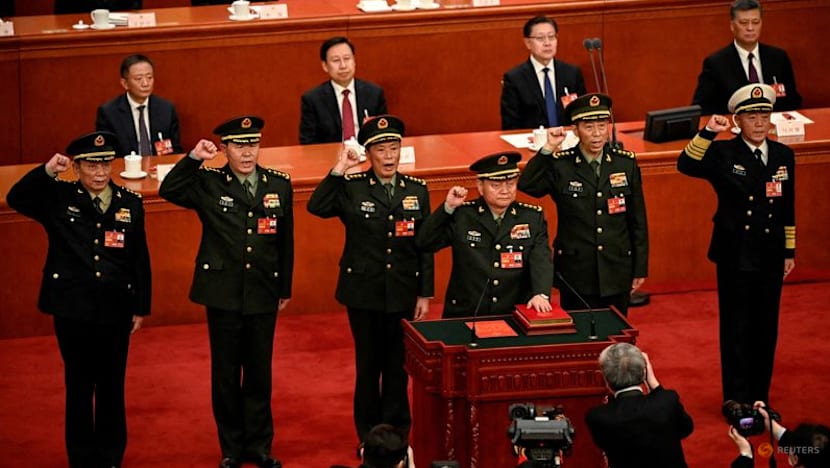
“The person that’s overseeing this ongoing purge is now given even more power - his position is now even closer to Xi,” said RSIS’ Yang.
“With that, you will probably anticipate an expansion of the purge.”
But even as Xi’s trusted disciplinarian cracks the whip, analysts said his role is focused on political loyalty rather than battlefield performance, and is unlikely to undermine the PLA’s operational readiness or modernisation drive.
Lin Ying-yu from Tamkang University noted that Zhang Shengmin comes from the party’s disciplinary inspection and political work system, not the chain of command.
“Within the PLA, or under Xi’s structure, there will effectively be two vice chairmen of the CMC - one overseeing military operations and the other, Zhang Shengmin, responsible for internal supervision and control,” he said.
“His background is in what used to be called the ‘handle of the knife’ - the system of discipline, inspection, and control within the army,” Lin Ying-yu added.
“Zhang (Shengmin) is not going to manage combat operations … his main role will be to enforce discipline inside the military.”

















